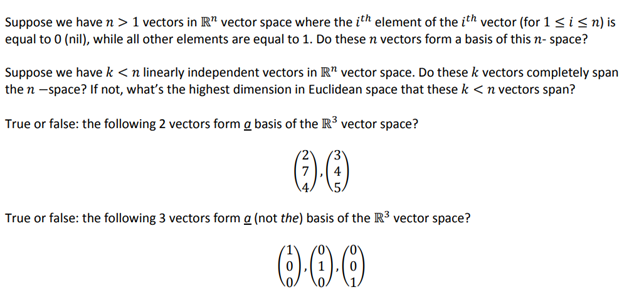Suppose we have n> 1 vectors in R" vector space where the ith element of the ith vector (for 1 ≤ i ≤n) is equal to 0 (nil), while all other elements are equal to 1. Do these n vectors form a basis of this n- space? Suppose we have k
Suppose we have n> 1 vectors in R" vector space where the ith element of the ith vector (for 1 ≤ i ≤n) is equal to 0 (nil), while all other elements are equal to 1. Do these n vectors form a basis of this n- space? Suppose we have k
Elementary Linear Algebra (MindTap Course List)
8th Edition
ISBN:9781305658004
Author:Ron Larson
Publisher:Ron Larson
Chapter5: Inner Product Spaces
Section5.CM: Cumulative Review
Problem 24CM
Related questions
Question

Transcribed Image Text:Suppose we have n> 1 vectors in R" vector space where the ith element of the ith vector (for 1 ≤ i ≤n) is
equal to 0 (nil), while all other elements are equal to 1. Do these n vectors form a basis of this n-space?
Suppose we have k <n linearly independent vectors in R" vector space. Do these k vectors completely span
the n-space? If not, what's the highest dimension in Euclidean space that these k < n vectors span?
True or false: the following 2 vectors form a basis of the R³ vector space?
(-)-()
True or false: the following 3 vectors form a (not the) basis of the R³ vector space?
0.0.0
Expert Solution
This question has been solved!
Explore an expertly crafted, step-by-step solution for a thorough understanding of key concepts.
Step by step
Solved in 3 steps with 3 images

Recommended textbooks for you

Elementary Linear Algebra (MindTap Course List)
Algebra
ISBN:
9781305658004
Author:
Ron Larson
Publisher:
Cengage Learning

Linear Algebra: A Modern Introduction
Algebra
ISBN:
9781285463247
Author:
David Poole
Publisher:
Cengage Learning

Algebra & Trigonometry with Analytic Geometry
Algebra
ISBN:
9781133382119
Author:
Swokowski
Publisher:
Cengage

Elementary Linear Algebra (MindTap Course List)
Algebra
ISBN:
9781305658004
Author:
Ron Larson
Publisher:
Cengage Learning

Linear Algebra: A Modern Introduction
Algebra
ISBN:
9781285463247
Author:
David Poole
Publisher:
Cengage Learning

Algebra & Trigonometry with Analytic Geometry
Algebra
ISBN:
9781133382119
Author:
Swokowski
Publisher:
Cengage